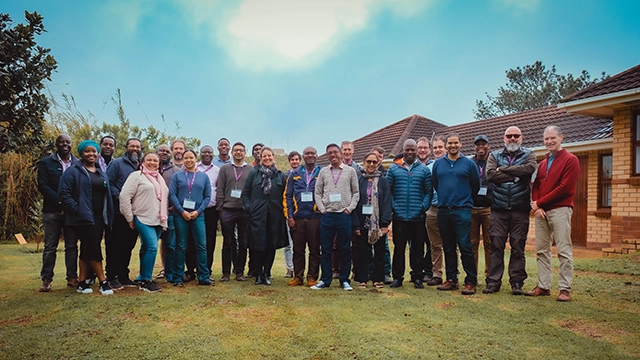
By:
Dr Bonita de Swardt, SARAO Programme Manager: Strategic Partnerships for Human Capital Development
Dr Stanley Kuja, Chair of the Local Organising Committee and Lead of the Rhodes University TART project
Scientists and engineers from nine African countries, including South Africa, have converged at Rhodes University in Makhanda to share knowledge in building a low-cost radio telescope called the ‘Transient Array Radio Telescope’ or TART. The workshop takes place at Rhodes’ Continuing Education Centre from 9 to 13 October 2023, where participants will learn to assemble the instrument, get to understand the electronics and gain hands-on experience using the data acquired by TART.
The workshop is funded by the South African Radio Astronomy Observatory (SARAO) with eight of the African VLBI Network (AVN) countries represented at the event that includes Botswana, Ghana, Kenya, Madagascar, Mauritius, Mozambique, Namibia and Zambia. The workshop is co-hosted by SARAO and Rhodes University, together with the University of Stellenbosch and the University of Otago in New Zealand, who are contributing to the lectures and facilitation of sessions.
The TART instrument was initially developed by Dr Tim Molteno from the University of Otago for the development and testing of state-of-art calibration and imaging algorithms for radio astronomy. The instrument is highly cost effective in its design with an open-source 24-element radio interferometer.
A collaboration effort between the University of Otago, Rhodes University and Stellenbosch University led to the first TART instrument being deployed in Africa, which is currently stationed at the Waainek Research Facility of Rhodes University in Makhanda. The Rhodes University group in collaboration with SARAO have continued to make technological updates to the instrument, which has led to further improvements in the design, efficiency and costing of the instrument.
The TART instrument at Rhodes University is currently used as both a training and research instrument. “We are very pleased to extend our collaborative research programmes in space technologies to the eight SKA partner countries in Africa through TART. The instrument offers many exciting research opportunities in different areas such as antenna design (including antenna arrays), calibration and imaging techniques, development of novel techniques for RFI monitoring, development and testing of state-of-the-art machine learning techniques using TART data, electronic system design, EMC metrology, and more,” says Dr Stanley Kuja, Chair of the Local Organising Committee and Lead of the Rhodes University TART project.
“The original TART was a fantastic design by Tim. Many university departments around the world have put up small single-dish student telescopes, but nobody was audacious enough to try to make a full-scale interferometer – it just seemed too complicated and expensive for a single group to tackle. Tim showed how to make one cheaply, using off-the-shelf parts,” says Distinguished Professor Oleg Smirnov, the SARAO Research Chair at Rhodes University. He further adds, “Following Tim’s lead, we had two students (Sonia Ghosh from Rhodes, and Rikus Human from Stellenbosch) build a second-generation TART at Rhodes in a few short months, on a minimal budget. This really proved to us that virtually anybody could construct one of their own, anywhere – making modern radio astronomy accessible to even the smallest university group. This makes it a great vehicle for building radio astronomy capacity on the African continent.”
The workshop will be run as a “train the trainer” event with participants expected to gain technical knowledge in building the instrument for future deployment in their home countries. Participants will also be introduced to calibration and imaging techniques for radio astronomy, which will provide them with the necessary skills to use the instrument once it is operational.
“The training workshop represents the beginning of a larger, more integrated TART programme with a first phase to deploy an instrument in each of the AVN countries,” says Carla Michell, the Africa Programme Manager at SARAO. She further adds, “I’m excited by the opportunities that this instrument brings to African countries in hosting their own radio telescope for training of students at a fraction of the cost of using a conventional radio telescope. It’s a win for Africa.”
Technical support for participants following the workshop will be provided by Rhodes University and SARAO. Following the deployment of a TART instrument in each of the AVN countries, the vision is to establish an integrated TART array across the continent that will allow for a larger part of the sky to be accessed for the detection and monitoring of radio transient events.
“We are hoping to establish a vibrant TART programme with African partners interested in expanding their teaching and research to include radio astronomy,” adds Dr Bonita de Swardt, SARAO Programme Manager: Strategic Partnerships for Human Capital Development. De Swardt elaborated that, “In the future, the programme may include knowledge exchanges through student workshops, mobility exchanges and research collaborations within the TART African network. The future of this project looks very promising.”
Financial support for the TART workshop and instrumentation is provided by the South African Department of Science and Innovation (DSI).
